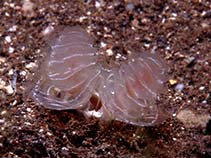Phoronopsis californica Hilton, 1930
California phoronid
Classification / Names Common names | Synonyms | CoL | ITIS | WoRMS
Not assigned | Not assigned | Phoronidae
Environment: milieu / climate zone / depth range / distribution range Ecology
Sessile; depth range 0 - 35 m (Ref. 865). Subtropical
Distribution Countries | FAO areas | Ecosystems | Occurrences | Introductions
Eastern Central Pacific: USA.
Length at first maturity / Size / Weight / Age
Maturity: Lm ? range ? - ? cm Max length : 4.0 cm H male/unsexed; (Ref. 865)
Life cycle and mating behavior Maturity | Reproduction | Spawning | Eggs | Fecundity | Larvae
Main reference
References | Coordinator | Collaborators
Emig, C.C. and C. de Mittelwihr 2005 Phoronida. Web site. (Ref. 1)
IUCN Red List Status
(Ref. 130435: Version 2025-1)
CITES status (Ref. 108899)
CMS (Ref. 116361)
Threat to humans
Human uses
| FishSource |
Tools
More information
Diet composition
Food consumption
Predators
Max. ages / sizes
Length-weight rel.
Length-length rel.
Length-frequencies
Mass conversion
Abundance
Internet sources
BHL | BOLD Systems | CISTI | DiscoverLife | FAO(Publication : search) | Fishipedia | GenBank (genome, nucleotide) | GloBI | Gomexsi | Google Books | Google Scholar | Google | PubMed | Tree of Life | Wikipedia (Go, Search) | Zoological Record



